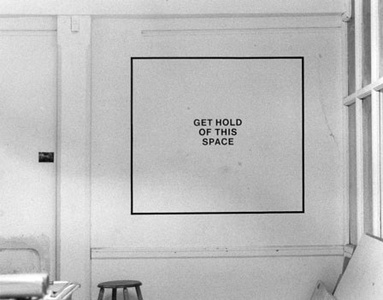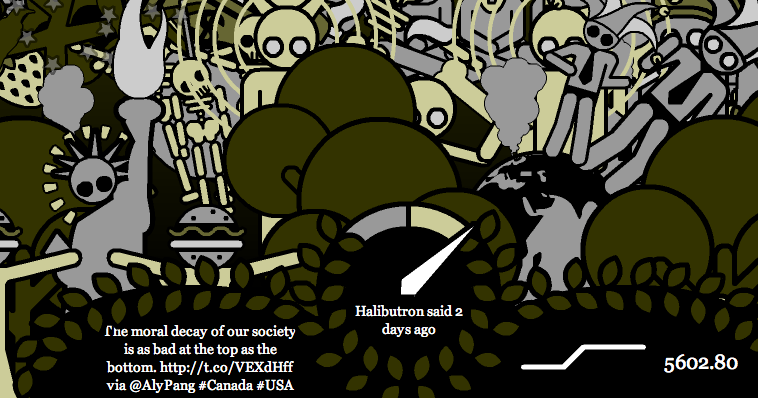Calen sent me this link of two chatbots talking with each other, AI vs. AI. Two chatbots talking to each other. I can’t help thinking the dialogue was scripted, but that doesn’t change the pleasure of imagining a chatbot getting irritated with another.
TRAFFIC: Conceptual Art in Canada 1965-1980
Gordon Lebredt Get Hold Of This Space 1974
Go see the TRAFFIC: Conceptual Art in Canada 1965-1980 exhibit at the Art Gallery of Alberta. It is a dense exhibit with hundreds of works and relevant documentation. It is organized by cities (a room for Halifax, one for Montreal …) and seems carefully researched. You will find yourself bewildered and amused at the variety of conceptual art projects executed in Canada. You will notice that everything was done back then with typewriters, video and tape recorders. The colors look bleached the way old and cheap photographs are. The aging of all those postcards and paper forms dates the works as if they were brought out of the attic or from the back of the family station wagon left in the sun.
This show was developed by a number of museums (from Vancouver to Halifax) and is touring those museums. You can read about the show when it was in Toronto. Or you can read about it in Magenta.
Minecraft Ph.D.
I came across a nice short essay by Alex Leavitt on Minecraft, “Open-Source Culture,” and Networked Game Development. Leavitt has a site, titled, Minecraft Ph.D. where he is documenting a project “about Minecraft that looks at the effect of large networks of people online on production in the creative industries.”
Locacious: Audio Walking Tours
Peigi sent me a link to Locacious a great new iPhone app that lets you create walking tours. (Location + Loquacious = Locacious … Get it?) The walking tours are made up of locations with an image, text (links), and audio. Historians are using it to author urban history tours like “Jane Jacobs in Greenwich Village; The Flatiron District.” the app is free, but you apparently have to pay to upload your tour so that others can access it.
Note: the Locacious app seems to have been retired. See iOSnoops entry.
DIYLILCNC
DIYLILCNC is a Do-It-Yourself little (LIL) Computer Numerical Controled mill. Useful for all those small wood-working projects.
Thanks to Scott for this.
Old Bailey Trials Are Tabulated for Scholars Online
The New York Times now has an article on the Criminal Intent project I was part of. See, Old Bailey Trials Are Tabulated for Scholars Online. They quote a historian who is sceptical of the results of mining, though he appreciates the resource.
“The Old Bailey Online project has done a great service in making those sources widely (and costlessly) available,” Mr. Langbein wrote in an e-mail. But he complained that the claims about data mining have “a breathless quality: ‘you can expect big things from us,’ but as yet it’s all method and no results.” He said that the new findings belittle the work of a generation of scholars who focused on the 18th century as the turning point in the evolution of the criminal justice system.
Alas, he seems didn’t read our report, but the summary in the Chronicle. It is easy to use cute phrases like “breathless quality”, but is he right? Time will tell, but I think the historians on our team have backed up the results found with mining and they never belittled the work of previous scholars – we saw ourselves building on it.
What can mining do? I think mining can give you a big picture so that you see the forest rather than trees in a way that no one could before. Conclusions about the shape of the forest have to be checked against other evidence, but the results of mining is evidence that is not breathless even if it takes your breath away. As Bill Turkel put it,
Mr. Turkel, who developed some of the digital tools, said that data mining reveals unexpected trends and connections that no one would have thought to look for before. Previous scholars “tended to cherry-pick anecdotes without having a sense that it was possible to measure all of that text and treat the whole archive as a single unit,” he said.
Of course, if you then leverage traditional evidence to buttress your argument then the mining is forgotten or trivialized.
The Garden of Error and Decay
The Garden of Error and Decay is a real-time visualization of disasters mentioned in Twitter and other feeds. The text about the interactive says “this innovative moving image format is something like a real-time data driven narrative. This project is not a film, not a game, and not a nonlinear interactive story.” The visualization uses pictograms that represent the type of disaster. You can see the original twitter text.
Thanks to Scott for this.
Turkel: A research workflow with off-the-shelf tools
I had heard about Bill Turkel’s ‘super secret’ project and how he had decided to keep the idea of the project secret but share the method, which is the opposite of what we usually do. As I am not on research leave (sabbatical) and working on 5 books (ha!) I thought I should learn from Bill. Here is the link to his excellent research workflow, How To « William J Turkel. What I like is that it is all stuff you can do with off-the-shelf tools, though not necessarily free ones.
Father Busa is dead
From Humanist I just found out that Father Roberto Busa has died. See Stop the reader, Fr. Busa has died in L’Osservatore Romano (English) or Morto padre Busa, è stato il pioniere dell’informatica linguistica from the Corriere del Veneto (Italian). Father Busa was a pioneer in humanities computing who started a project in the 1940s with help from IBM to create a complete concordance of Acquinas. The Index Thomisticus was arguably the first (big) humanities project to benefit from computing methods. For that reason the author of Stop the reader argues that,
If you surf the Internet, you owe it to him and if you use a PC to write emails and documents, you owe it to him. And if you can read this article, you owe it to him, we owe it to him
While it may be an exaggeration to say that we owe hypertext and the web to Father Busa, he was certainly one of the first to use computers to manipulate texts on a large scale. He saw the
Father Busa was also involved in developing the humanities computing field which is why we have named a prize after him. (See ADHO Roberto Busa Award). He wrote articles for journals like CHUM and Literary and Linguistic Computing. He was generous with his time and ideas. He was influential in Italy; others will know more about this. I met him in 1998 at the ACH/ALLC conference in Debrecen, Hungary where he was awarded the first Busa Award. As I speak Italian I was asked to join an executive dinner and had a pleasant evening talking about his ideas about hermeneutical text analysis which he delivered in his Award talk and which were later published in “Picture a Man …” in Literary and Linguistic Computing (14:1, 1999). At the end of his talk he played with the Cinderella metaphor for interpretative text analysis,
Metaphor is a linguistic phenomenon: when the name of one reality is chosen to signify another and different reality, because of some similarity between the two. I in fact applied the name of Cinderella to hermeneutical informatics, the two having in common youth, health, beauty, and poverty. Cinderella eventually got married to a prince. (p. 8)
Busa was a prince or perhaps a Cinderella who has now left the party.
Internet use and transactive memory – Contemplative Computing
From Humanist I was led to a good summary blog entry on Internet use and transactive memory. Transactive memory is a group or stored memory that we depend on instead of remember the information itself. We do this all the time (even before computers) when, for example, we depend on a cookbook for a recipe we have used before, but can’t be bothered to memorize. Given books like Carr’s The Shallows, there is debate about whether Google and the internet as transactive memory is making us stupider.
The real question is not whether offloading memory to other people or to things makes us stupid; humans do that all the time, and it shouldn’t be surprising that we do it with computers. The issues, I think, are 1) whether we do this consciously, as a matter of choice rather than as an accident; and 2) what we seek to gain by doing so.
This entry was sparked by recent news of research results on this subject by Dr. Sparrow and others (see YouTube interview). You can see Carr’s blog entry at Rough Type: Nicholas Carr’s Blog: Minds like sieves. Carr seems to think this reinforces his view that we are shifting to depending too much on technological transactive memory. Sparrow is more careful about drawing conclusions. We may have always depended on transactive memory, but are focusing now on one type – the internet. In Plato’s Phaedrus Socrates focused on writing as the technology tempting us to forget.
Of course, forgetting costs so we may not have to worry if we don’t want to pay.



